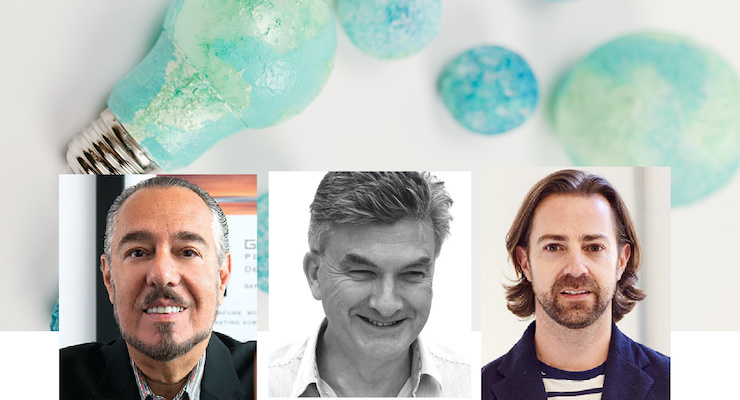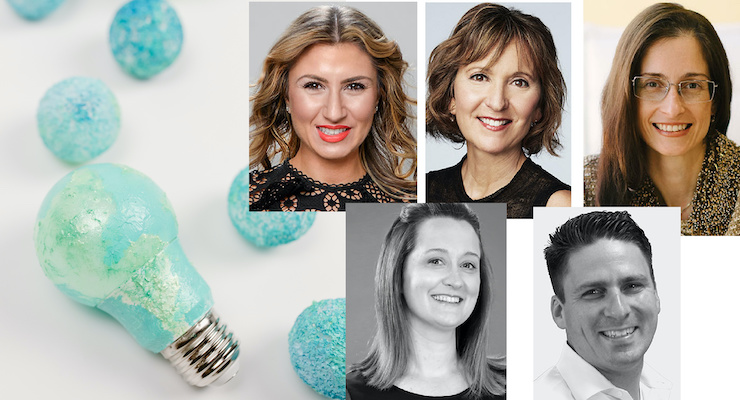Jamie Matusow, Editor-in-Chief08.11.21
We asked innovative forward-thinking brand owners and designers for their insights regarding the future of beauty in light of the growing demand for sustainable packaging—and the challenges that lie ahead.
Following are their telling responses.
Want to join the conversation? We’d love to hear from you. Please email me with your thoughts.
Beauty Brands Share Insights
Jess Abrams, Executive Director, Sustainable Development, Shiseido Americas
“It’s all about industry alignment. This is where I see the future of sustainable beauty heading—bringing together vendors, suppliers, and competitors. The cosmetics industry produces more than 120 billion units of packaging annually—the problem is larger than any individual brand, vendor or corporation.""We are all facing similar challenges at various stages of the supply chain, so why not share our learnings to better the industry?”
Abrams share more thoughts in the column: It’s All About Industry Alignment
Nicole Call, Director of Package Development, Aveda
“Sustainability in packaging is having a moment right now, although it’s something that’s always been important to us at Aveda. Consumers are demanding more and more from the brands they support. Not only do they want more effort to be made around sustainability, they want honesty and transparency."“To me, the future of sustainability in packaging lies in two main areas: innovation around materials and closing the loop on materials that aren’t currently recyclable."
"When it comes to materials, one area of innovation I’m excited about is mono-materials, and 'recycle-ready' packaging, which we used with our Botanical Repair Collection. Using mono-material, meaning the tube and cap consists of only one material instead of a blend of materials, allows the tubes to be able to be recycled once municipalities choose to accept them into the recycling ecosystem.”
Karen Behnke, Founder, Juice Beauty
“When Juice Beauty started in 2005, eco-friendly packaging options were few and far between. So everyone at Juice Beauty is thrilled that the beauty world is starting to focus more on sustainability and that the packaging community is providing more innovative options."“Sustainability must include what is inside the bottle, plus packaging— plus, entire company practices. This means organic ingredients in a product to achieve sustainability for the planet, with packaging made from 100% recycled plastic or glass bottles with pumps—that consumers don’t need a PhD to figure out how to recycle. Plus, FSC or recycled boxes….and all manufactured with solar power."
"Although I love the idea of refillables, I am concerned that given the new sanitizing world we live in that refillables will have to be unbelievably high-tech so consumers trust the cleanliness."
“Looking ahead, our greatest challenge is to achieve in-store sampling, truly sustainable packettes, and deluxe sample sizes.”
Laszlo Moharita, Head of Self-Care Packaging and R&D e-Commerce Initiatives, Johnson & Johnson
“The future of beauty lies on the convergence of packaging sustainability and e-Commerce. As the pandemic exacerbated consumers’ use of online outlets, brands will be pressured to design solutions that reduce the amount of protective materials and unnecessary plastics. Think about Amazon's protective bags, for example.""And beauty brands must do their part in educating consumers on how to recycle."
“To this end, suppliers will need to innovate at a much faster rate to provide solutions that help brands achieve these objectives."
"Metal-free dispensing pumps that can survive the impact of e-commerce shipping, sustainable refillable pouches that ease the brands’ anxiety of switching to new business models, and more sustainable shipping materials are just a few examples."
"Finally, consumers need to continue to demand more sustainable packaging solutions, embrace refillable business models, and do their part at the end of the recycling process by separating packaging materials to complete the cycle.”
Barbara Paldus, PhD and founder, Codex Beauty Labs
“When we started Codex Beauty Labs in 2018, we didn’t want to compromise on our carbon footprint. FSC and PEFC certified cartons were a must and fairly easy to find, but mono-material airless tubes made from green polyethylene (PE) didn’t exist.""It takes great force of will to make sustainable packaging, but we were fully committed to carving this path for the beauty industry. We found a great partner in Brazil, and launched in 2019 with mostly PE tubes that were still far more carbon-footprint-friendly than fossil-fuel-based packaging."
"We are excited to be launching mono-material 'green' PE airless tubes in 2021. We are also working with a German partner on green polyethylene bottles for 2022. So our dream is finally coming true.”
Package Designers Speak Out

Designer Marc Rosen, Echo Brand Design’s Nick Dormon, and Free the Birds’ Nick Vaus discuss the future of sustainable packaging.
Marc Rosen, President, Marc Rosen Associates
“As designers, for our packaging to be sustainable, we must reimagine and reinvent the perception of 'beauty packaging'. It is even more challenging for luxury packaging.""Instead of ‘more is more’ we must design packaging where ‘less is more’—using materials that are sustainable and represent a new modern definition of luxury.”
Nick Dormon, Founder, Managing Director, Echo Brand Design
“Can brands help change consumers’ viewpoint on what ‘premium’ looks and feels like?""The challenge for beauty brands is to craft a premium packaging experience while being kind to the planet. Desirable beauty packaging has long equated to excessive packaging as part of the lavish unboxing ritual, quality delivered via heavy glass or plastic vials."
"This idea is starting to lose relevance as more consumers are demanding brands to reduce their packaging and eradicate their use of plastic. A new wave of eco-minded beauty brands is utilizing next-generation sustainable materials to lighten their carbon footprint and visually reflect their sustainable ethos."
"Brands such as Haeckels are using packaging made from mycelium, a natural, renewable resource that can be grown to order. These new materials put sustainable purpose front and center and make a real statement at shelf—without the need for material excess.”
Nick Vaus, Partner & Creative Director, Free the Birds
“Consumers are becoming more and more aware of greenwashing practices, and ‘organic’ on the label doesn’t cut through anymore. Some Indie beauty brands like Cocokind are adding carbon labeling to their packaging to assure consumers that the products are eco-friendly and urging them to recycle the packaging after use.""There are also an increasing number of beauty brands achieving B Corp status. As consumer awareness of what B Corp actually means continues to grow, this level of transparency and measurable impact on social and environmental issues might well be the next frontier of sustainable beauty brands and packaging.”




























